Costly Mistakes Made By Plaintiffs
While many plaintiffs find that filing a small claims court case at their local county court house is a fairly simple process, they quickly learn that seeing the process through is anything but easy. Many first time litigators find themselves committing the same mistakes over and over again resulting in additional fees, delayed hearings or a failed recovery. We have compiled a list of some of the most common mistakes litigants make when initiating a lawsuit.
Not properly naming their defendant
Many plaintiffs fail to properly name their defendant which can make collecting any judgment awarded nearly impossible. Instead of naming a defendant as Joseph Smith they will name the defendant as Joe Smith. Using shortened versions of names like Bill instead of William, John instead of Johnathan or Rick instead of Richard can mean that plaintiffs end up with a judgment against a party that does not legally exist. They often find this out when their garnishment efforts are thwarted because the bank denies the order because their customer’s name is Richard and not Rick. This same mistake is also made when suing companies. Joes Auto Body may be the name a plaintiff remembers but their actual name may be Joes Custom Auto Body, LLC. Likewise naming a business as an LLC that is a corporation and vice versa leaves the litigator with a useless judgment that is difficult to amend after the fact.
Not serving the debtor properly
Too often we have seen judgments overturned or set aside just when the judgment creditor starts to actually collect on their judgment. The most common reason a judge will set aside a judgment is lack of proper service. When a plaintiff files a lawsuit they must properly serve the defendant. While the court may accept a certified letter at the entry of judgment, without an affidavit of service from a sheriff or officer of the court, nearly every judge will set the judgment aside. While properly serving a defendant make take more time, doing it the right way is paramount to obtaining a judgment that will not be tossed the second the defendant decides to start fighting.
Filing in the improper venue
Most individuals first though when considering a small claims action is to go to their local court house and file a lawsuit in their county. They think that it may be easier on them and it should be the person they are suing that has to fight the battle in enemy territory not them. Unfortunately failing to file a suit in the right venue can lead to the case being dismissed and the plaintiff possibly having to pay the opposing sides attorney fees for an improper filing. Every state and county has laws and rules as to which court has proper jurisdiction. Some areas require the action to be filed where the work or purchase was actually made. Some areas require the action be filed in the jurisdiction of the defendant. In addition to jurisdictional restraints, the contract or terms that are the subject of the dispute may also specify jurisdiction through choice of venue or governing jurisdiction clauses which can be forced if the defendant is paying attention.
While some individuals have experience litigating claims, most first time plaintiffs run a great risk on filing a case without formal training. These are just a few of the common issues faced by litigants however there are many other pitfalls that the inexperienced may fall victim to. Instead of risking your case trying to do it yourself, contact us for a free consultation by completing the form on the right of this page or by calling us at 407-374-0000.
